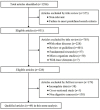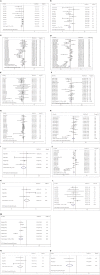The Relationship Between Plant-Based Diet and Risk of Digestive System Cancers: A Meta-Analysis Based on 3,059,009 Subjects
- PMID: 35719615
- PMCID: PMC9204183
- DOI: 10.3389/fpubh.2022.892153
The Relationship Between Plant-Based Diet and Risk of Digestive System Cancers: A Meta-Analysis Based on 3,059,009 Subjects
Abstract
Background and objectives: Diets containing red or processed meat are associated with a growing risk of digestive system cancers. Whether a plant-based diet is protective against cancer needs a high level of statistical evidence.
Methods: We performed a meta-analysis of five English databases, including PubMed, Medline, Embase, Web of Science databases, and Scopus, on October 24, 2021 to identify published papers. Cohort studies or case-control studies that reported a relationship between plant-based diets and cancers of the digestive system were included. Summary effect-size estimates are expressed as Risk ratios (RRs) or Odds ratios (ORs) with 95% confidence intervals and were evaluated using random-effect models. The inconsistency index (I2) and τ2 (Tau2) index were used to quantify the magnitude of heterogeneity derived from the random-effects Mantel-Haenszel model.
Results: The same results were found in cohort (adjusted RR = 0.82, 95% CI: 0.78-0.86, P < 0.001, I2 = 46.4%, Tau2 = 0.017) and case-control (adjusted OR = 0.70, 95% CI: 0.64-0.77, P < 0.001, I2 = 83.8%, Tau2 = 0.160) studies. The overall analysis concluded that plant-based diets played a protective role in the risk of digestive system neoplasms. Subgroup analyses demonstrated that the plant-based diets reduced the risk of cancers, especially pancreatic (adjusted RR = 0.71, 95% CI: 0.59-0.86, P < 0.001, I2 = 55.1%, Tau2 = 0.028), colorectal (adjusted RR = 0.76, 95% CI: 0.69-0.83, P < 0.001, I2 = 53.4%, Tau2 = 0.023), rectal (adjusted RR = 0.84, 95% CI: 0.78-0.91, P < 0.001, I2 = 1.6%, Tau2 = 0.005) and colon (adjusted RR = 0.88, 95% CI: 0.82-0.95, P < 0.001, I2 = 0.0%, Tau2 = 0.000) cancers, in cohort studies. The correlation between vegan and other plant-based diets was compared using Z-tests, and the results showed no difference.
Conclusions: Plant-based diets were protective against cancers of the digestive system, with no significant differences between different types of cancer.
Systematic review registration: https://www.crd.york.ac.uk/prospero/display_record.php?ID=CRD42022322276, Identifier: CRD42022322276.
Keywords: cancer; digestive system; eating habits; meta-analysis; plant-based diet.
Copyright © 2022 Zhao, Zhan, Wang and Wang.
Conflict of interest statement
The authors declare that the research was conducted in the absence of any commercial or financial relationships that could be construed as a potential conflict of interest.
Figures



References
-
- Global Global Burden of Disease Cancer C. Fitzmaurice C, Allen C, et al. . Global, regional, and national cancer incidence, mortality, years of life lost, years lived with disability, and disability-adjusted life-years for 32 cancer groups, 1990 to 2015: a systematic analysis for the global burden of disease study. JAMA Oncol. (2017) 3:524–48. 10.1001/jamaoncol.2016.5688 - DOI - PMC - PubMed
-
- World Cancer Research Fund/American Institute for Cancer Research Diet Nutrition Physical Activity Cancer: A Global Perspective. Continuous Update Project Expert Report. (2018). Available online at: http://dietandcancerreport.org (accessed on April 19, 2022).
Publication types
MeSH terms
LinkOut - more resources
Full Text Sources

